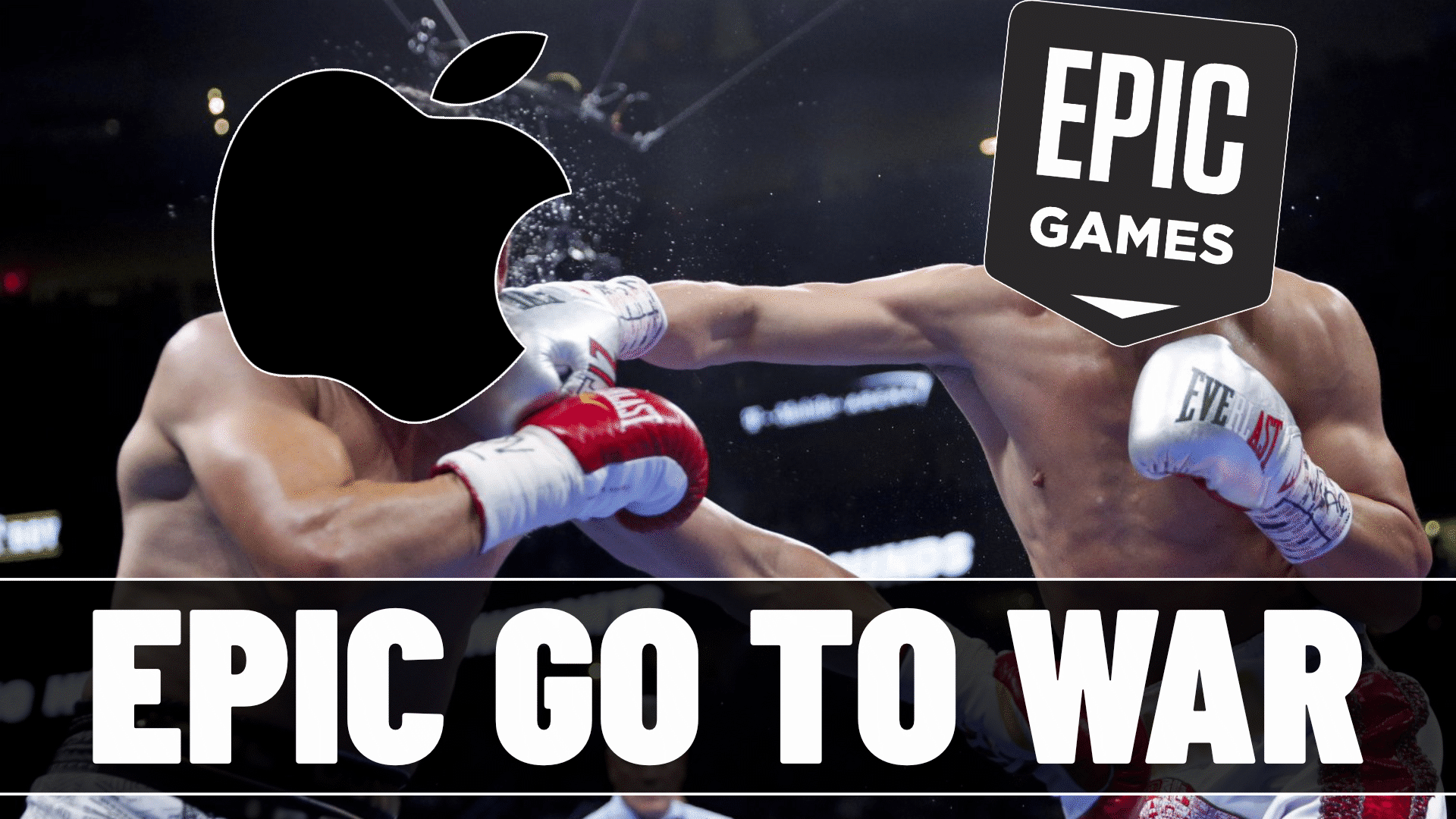New Fortnite Lawsuit Targets Epic Games' In-Game Store Practices

Table of Contents
Key Allegations of the Fortnite Lawsuit
The lawsuit against Epic Games centers on several key allegations regarding the fairness and transparency of Fortnite's in-game store practices. These allegations focus on deceptive marketing, predatory pricing strategies, and the targeting of vulnerable players.
Deceptive Marketing and Loot Box Mechanics
The lawsuit argues that Fortnite's loot box system and its marketing are deliberately misleading. Players are not given complete information about the odds of obtaining rare or desirable items, leading to potentially unfair spending.
- Claims of "random chance" without transparent probability disclosures: The lawsuit points out that while Epic Games markets loot boxes as offering a chance at rare items, the actual probabilities are not clearly disclosed to players. This lack of transparency is seen as a deceptive practice.
- Aggressive marketing targeting younger, vulnerable players: Fortnite's vibrant marketing campaigns, often featuring exciting visuals and popular influencers, are criticized for specifically targeting younger players who may be more susceptible to impulsive spending.
- Use of emotionally manipulative language and imagery: The lawsuit alleges that Epic Games uses emotionally manipulative language and imagery in its marketing, designed to create a sense of urgency and excitement, encouraging players to spend money without fully considering the implications.
Predatory Pricing and Microtransactions
The lawsuit alleges that the prices of virtual items in the Fortnite in-game store are excessively high, designed to exploit players' psychological biases and encourage overspending.
- Examples of exorbitant prices for cosmetic items: The lawsuit cites specific examples of virtual items, such as skins and emotes, that are priced far higher than their perceived value, exploiting the desire for unique in-game appearances.
- Comparison to prices in similar games: The lawsuit compares Fortnite's pricing to similar games, highlighting how its microtransactions are significantly more expensive, suggesting a deliberate strategy of predatory pricing.
- Discussion of the "pay-to-win" aspect, even if indirect: Although Fortnite isn't strictly a "pay-to-win" game, the lawsuit argues that the pressure to purchase cosmetic items to keep up with other players creates an indirect pay-to-win dynamic, further fueling spending.
Targeting of Vulnerable Players
A significant aspect of the lawsuit focuses on the vulnerability of Fortnite's player base, which includes a large number of children and teenagers. These young players may lack the financial awareness and critical thinking skills to resist manipulative marketing tactics.
- Discussion of parental controls and their effectiveness: The lawsuit examines the efficacy of parental controls within Fortnite and argues that they are insufficient to protect young players from overspending.
- Mention of age verification processes and their limitations: The lawsuit discusses the limitations of age verification processes, highlighting how easy it can be for underage players to bypass these systems and make in-app purchases.
- Statistics on youth spending on in-game purchases: The lawsuit may include statistics highlighting the significant amount of money spent by young players on in-game purchases, emphasizing the potential for financial harm.
Potential Impact and Legal Ramifications of the Fortnite Lawsuit
The Fortnite lawsuit carries significant potential implications for both Epic Games and the wider gaming industry. Its outcome could set legal precedents and influence future regulations concerning in-game purchases.
Precedent for Future Lawsuits
This lawsuit could establish a critical legal precedent for future cases involving in-game purchases and deceptive marketing practices in the gaming industry.
- Discussion of similar lawsuits against other game developers: The lawsuit builds upon a growing body of similar legal actions against game developers facing accusations of deceptive in-game store practices.
- Analysis of potential legal outcomes (e.g., fines, changes to in-game store practices): Potential outcomes range from financial penalties for Epic Games to mandated changes in their in-game store practices, including increased transparency regarding loot box odds and pricing.
- Mention of regulatory bodies and their potential involvement: Regulatory bodies like the FTC (Federal Trade Commission) in the US and similar organizations globally may become increasingly involved in regulating in-game purchases following this lawsuit.
Industry-Wide Implications
Regardless of the outcome, the Fortnite lawsuit will likely prompt a broader discussion about the ethics and legality of in-game store practices across the gaming industry.
- Potential for increased regulation of loot boxes and microtransactions: The lawsuit may accelerate the movement towards stricter regulations on loot boxes and other microtransaction systems within video games.
- Impact on the business model of free-to-play games: The outcome could significantly impact the business model of many free-to-play games that rely heavily on microtransactions for revenue.
- Changes in marketing strategies across the industry: Game developers may be compelled to revise their marketing strategies, adopting greater transparency and ethical considerations.
Conclusion
This Fortnite lawsuit against Epic Games highlights growing concerns regarding the ethical and legal implications of in-game store practices. The allegations of deceptive marketing, predatory pricing, and targeting of vulnerable players raise serious questions about the industry's responsibility to protect consumers. The outcome will likely have a significant impact on the future of microtransactions and loot boxes in gaming. Stay informed about further developments in this landmark Fortnite lawsuit and the ongoing discussion surrounding responsible in-game spending. Understanding the details of this case is crucial for players and parents alike to navigate the complexities of the Fortnite in-game store and similar systems in other games. The implications of this Fortnite lawsuit extend far beyond the game itself, potentially reshaping the entire landscape of in-app purchases and loot box mechanics in the gaming industry.

Featured Posts
-
 Brasilien Und Die Vae Wirtschaftliche Chancen In Den Favelas
May 17, 2025
Brasilien Und Die Vae Wirtschaftliche Chancen In Den Favelas
May 17, 2025 -
 Review Of 7 Bit Casino And Other Top Online Casinos In Canada For 2025
May 17, 2025
Review Of 7 Bit Casino And Other Top Online Casinos In Canada For 2025
May 17, 2025 -
 Limited Time Fortnite Cowboy Bebop Skins And Items How To Get Them
May 17, 2025
Limited Time Fortnite Cowboy Bebop Skins And Items How To Get Them
May 17, 2025 -
 Managing Student Loan Debt Expert Financial Planning Advice
May 17, 2025
Managing Student Loan Debt Expert Financial Planning Advice
May 17, 2025 -
 Fortnite Issues Refunds A Sign Of Cosmetic Changes
May 17, 2025
Fortnite Issues Refunds A Sign Of Cosmetic Changes
May 17, 2025
Latest Posts
-
 Unlock Bet365 Bonus Code Nypbet Knicks Vs Pistons Series Betting Guide
May 17, 2025
Unlock Bet365 Bonus Code Nypbet Knicks Vs Pistons Series Betting Guide
May 17, 2025 -
 Nba Playoffs Knicks Vs Pistons Betting Preview With Bet365 Bonus Code Nypbet
May 17, 2025
Nba Playoffs Knicks Vs Pistons Betting Preview With Bet365 Bonus Code Nypbet
May 17, 2025 -
 Bet365 Nypbet Bonus Code Your Guide To Knicks Vs Pistons Odds And Picks
May 17, 2025
Bet365 Nypbet Bonus Code Your Guide To Knicks Vs Pistons Odds And Picks
May 17, 2025 -
 Roma Vs Monza Partido En Directo
May 17, 2025
Roma Vs Monza Partido En Directo
May 17, 2025 -
 Crystal Palace Vs Nottingham Forest Resultado En Directo Y Resumen
May 17, 2025
Crystal Palace Vs Nottingham Forest Resultado En Directo Y Resumen
May 17, 2025
